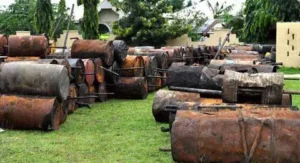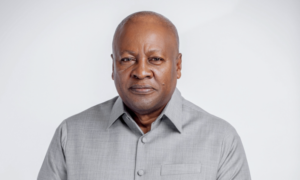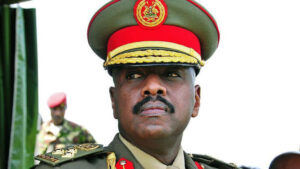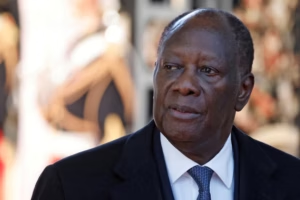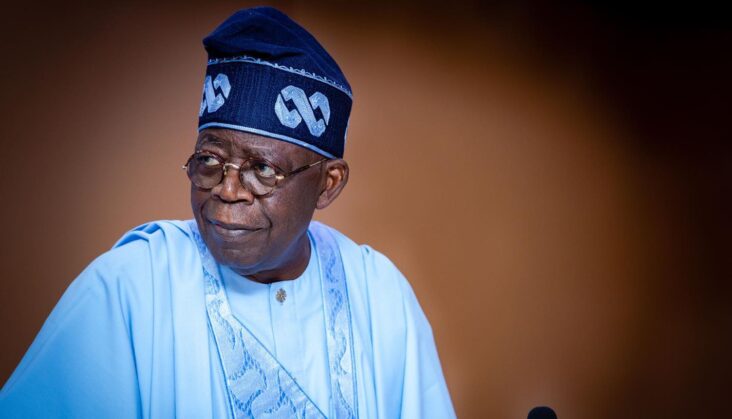
President Bola Tinubu has set up a committee to raise Nigeria’s tax-to-GDP ratio from 10% to 18% this year – but to do this, he may need to reconsider some of his government’s major money pits.
Tinubu has carried out a number of reforms. He has removed costly petrol subsidies which consume trillions of naira annually, floated the currency and increased a number of taxes – including a 7.5% value-added tax on petrol – to shore up revenue. Future plans to cut subsidies on electricity, for example, will also help boost coffers.
But the poor have been at the receiving end of these policies, with many families struggling to cope with rising inflation and spiraling cost of living in Africa’s most populous nation.
“The poor should not bear the brunt alone. The rich, especially the politicians, should also take their own share. My worry is that these good policies are not matched with necessary cuts in wastages,†says Ikeh Ibeh, an Abuja-based procurement expert with over 15 years of experience.
“For instance, can he look at contract inflation? Does Tinubu have the courage to order the probe of all ongoing contracts, including the ongoing refinery rehabilitation in Port Harcourt, Kaduna and Warri? Does he have the courage to examine the books of the ministries regarding all ongoing contracts?â€Â
Here are four areas where potential savings could be made.
Aircraft
Tinubu maintains 10 presidential aircraft which he inherited from his predecessor, Muhammadu Buhari. Each of the aircraft costs N11.6bn ($15.42 million) annually to maintain. Cash-strapped Nigeria spent N81bn ($176.08m) on the maintenance of aircraft between 2016 and 2022, with their cost of operations rising by 121% in seven years, according to a local newspaper, The Punch.
The 10 aircraft are still parked in Nigeria, maintained with scarce petrodollars.
At an annual cost of N300,000, the N81bn spent on aircraft maintenance over the period could fund the education of 324,000 out-of-school children, says Betram Ezenwaka, an Onitsha-based educationist and school proprietor.
The total number of out-of-school children in Nigeria is currently 20bn, according to the United Nations Educational, Scientific and Cultural Organization (UNESCO).
Former President Buhari had promised to cut the size of his fleet in 2015 when he came to power but failed to live up to his promise, and Tinubu has shown no plans to reduce it even after one month in office.
The president’s spokesperson, Dele Alake, did not respond to text messages sent to him on whether there are plans by his boss to cut the size of the aircraft or
governance costs in Africa’s most populous nation.
“Our major priority as a nation should be to cut down on those humongous but unnecessary costs and channel them to education and health where affordability and accessibility are big issues,†Ezenwaka adds.
Refineries
The National Petroleum Corporation (NNPC) Limited is still spending $2.98bn (N2.3trn) on the rehabilitation and maintenance of Port Harcourt, Kaduna and Warri refineries even when there is a business case to privatise them.
Port Harcourt refinery incurred comprehensive losses totaling N241.61bn ($671.14m) between 2017 and 2020. Warri refinery lost N178.31bn ($494m) between 2017 and 2019, while the Kaduna refinery incurred cumulative losses of N239.249bn within the same period.
Tinubu has shown a keen interest in the oil sector by removing the costly petrol sector but has not extended such zeal to cutting costs in the refining sector.
Muda Yusuf, chief executive officer of the Centre for the Promotion of Private Enterprise, sees such expenditure as unnecessary, stressing that the refineries should be privatised.
“The refineries or the NNPC itself should be privatised. Those refineries should not be in the hands of the NNPC because they have proven incapable of managing them,†he says.
The NNPC Limited has been mired in opacity. The 2016 Auditor-General of the Federation report had accused the state-owned oil company of failing to provide details of crude oil delivered to Warri and Kaduna refineries valued at $377m (N102.6bn).Â
Ministries, departments and agencies
Similarly, Nigeria has 943 ministries, departments and agencies (MDAs) and 541 corporations operated with public funds. Most of them perform overlapping functions, with notable examples being the Standards Organisation of Nigeria (SON), the National Food and Drug Administration and Control (NAFDAC), Weights and Measures as well as Nigeria Agriculture Quarantine Service (NAQS). The MDAs gulp 75% of annual government expenditures, according to Ben Akabueze, director-general of the Budget Office of the Federation.
The MDAs have become a drain on government revenues with reports of staff redundancies and backdoor recruitments. The 2017 Auditor-General of the Federation report revealed that the accountant-general of the Federal loaned N910bn to MDAs with no plans of recovering the debt. The loans were yet to be repaid as of early June 2023, according to the Nigerian Senate.
More than 37 MDAs were equally accused in the report of operating without accounts amid other levels of financial improprieties.
“We have the issue of duplication of MDAs and political appointees which should be addressed. Fiscal sustainability is not just about revenues, but also about the reduction in the cost of governance,†Yusuf says.
“A lot of issues have been raised by the auditor-general’s reports, but 90% of them have not been addressed. It is a pointer that there is a lot of cleaning up to be done as far as the management of MDAs is concerned.â€Â
Local debt
Another major area of concern is the N5.2trn ($7bn) debt owed by the Nigerian government from 11 MDAs and over 7,000 corporate entities. This amount, which is a quarter of the 2023 budget, represents 10.43% of Nigeria’s total debt.
More so, N16.76trn ($36.43bn) was controversially given to companies in incentives between 2019 and 2022. Some of the incentives and waivers are still being enjoyed by large enterprises – and experts are asking the government to review and cancel them.
An economics professor at Covenant University, Ogun State, Jonathan Aremu, says Tinubu must look at fiscal and monetary policies affecting the cost of governance in the country.
“Quite a lot of things happen in terms of waivers, and unnecessary incentives have been given to undeserving companies. All these lead to a lot of leakages. He has to look at fiscal areas and the activities of the CBN as seen recently. One is the issue of corruption, which has become part of us,†he says.
